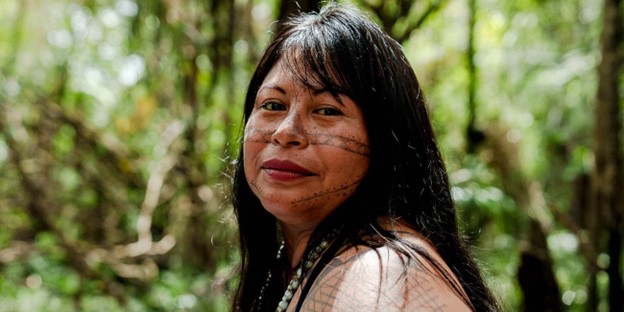
Alessandra Korap was recognized with Goldman Environmental Prize, an award that honors grassroots activists worldwide dedicated to protecting the environment and promoting sustainability.
Korap was born in the mid-1980s in her Indigenous village in the Amazon rainforest in Brazil. As she grew up, the bustling streets and commercial activity of nearby cities crept closer and closer to her village, posing a threat to Korap’s people.
Two major federal highways paved the way for tens of thousands of settlers, illegal gold miners, and loggers into the region’s vast Indigenous territories, which cover a forested area roughly the size of Belgium.
Korap’s Munduruku people, 14,000 strong and spread throughout the Tapajos River Basin in Para and Mato Grosso states, were threatened by this influx. Soon illegal mining, hydroelectric dams, a central railway, and river ports for soybean exports choked their lands — lands they were still struggling to have recognized.
Korap and other Munduruku women defended their people, overturning the traditionally all-male leadership. They orchestrated demonstrations, presented compelling evidence of an environmental crime to the Federal Attorney General and Federal Police, and vehemently opposed illicit agreements and incentives offered to the Munduruku by unscrupulous miners, loggers, corporations, and politicians seeking access to their land.
“This award is an opportunity to draw attention to the demarcation of the Sawre Muybu territory,” Korap told The Associated Press. “It is our top priority, along with the expulsion of illegal miners.”
Studies have shown that Indigenous-controlled forests are the best preserved in the Brazilian Amazon. In 2021, the Munduruku people celebrated a victory when the British mining company, Angelo American, gave up trying to mine inside Indigenous territories in Brazil.
Almost half of Brazil’s climate pollution comes from deforestation. The destruction is so vast now that the eastern Amazon has ceased to be a carbon sink, according to a study published in 2021 in the journal Nature.
Korap remains skeptical of President Luiz Inácio Lula da Silva’s decision to create the country’s first Ministry of Indigenous Peoples and to drive out miners. She sees his actions as contradictory, noting that while he advocates for forest protection, he also negotiates trade deals with other countries, Brazil’s main deforestation drivers.

Recent Comments